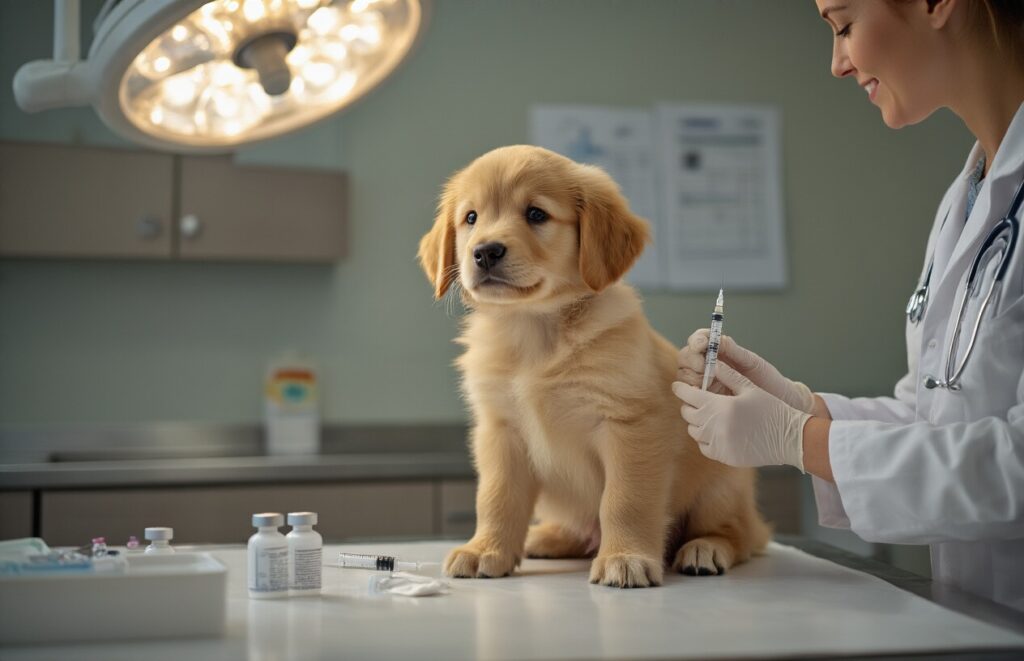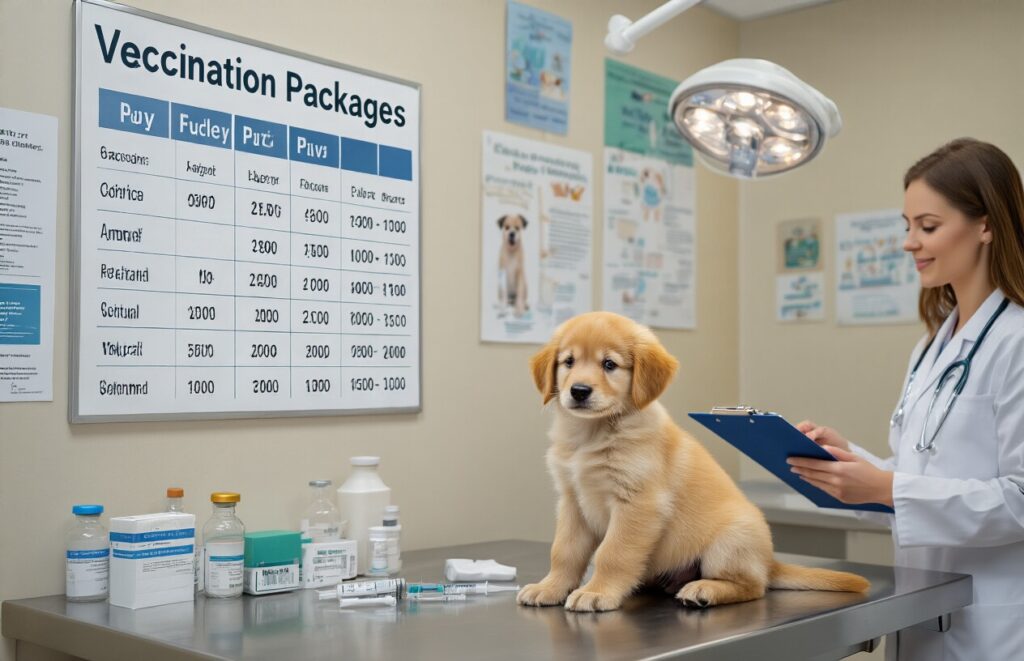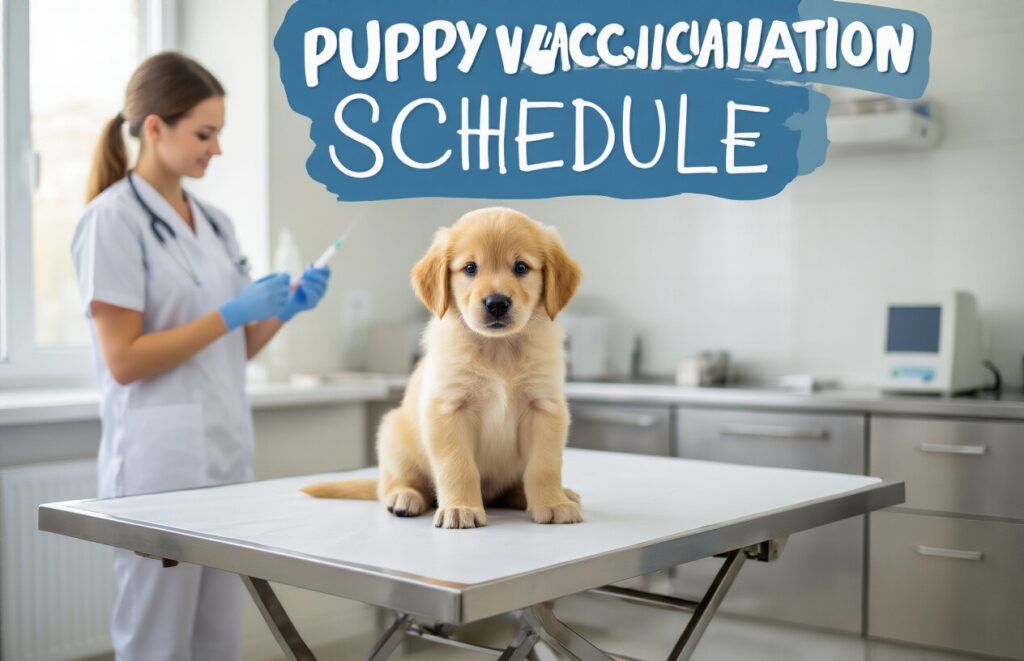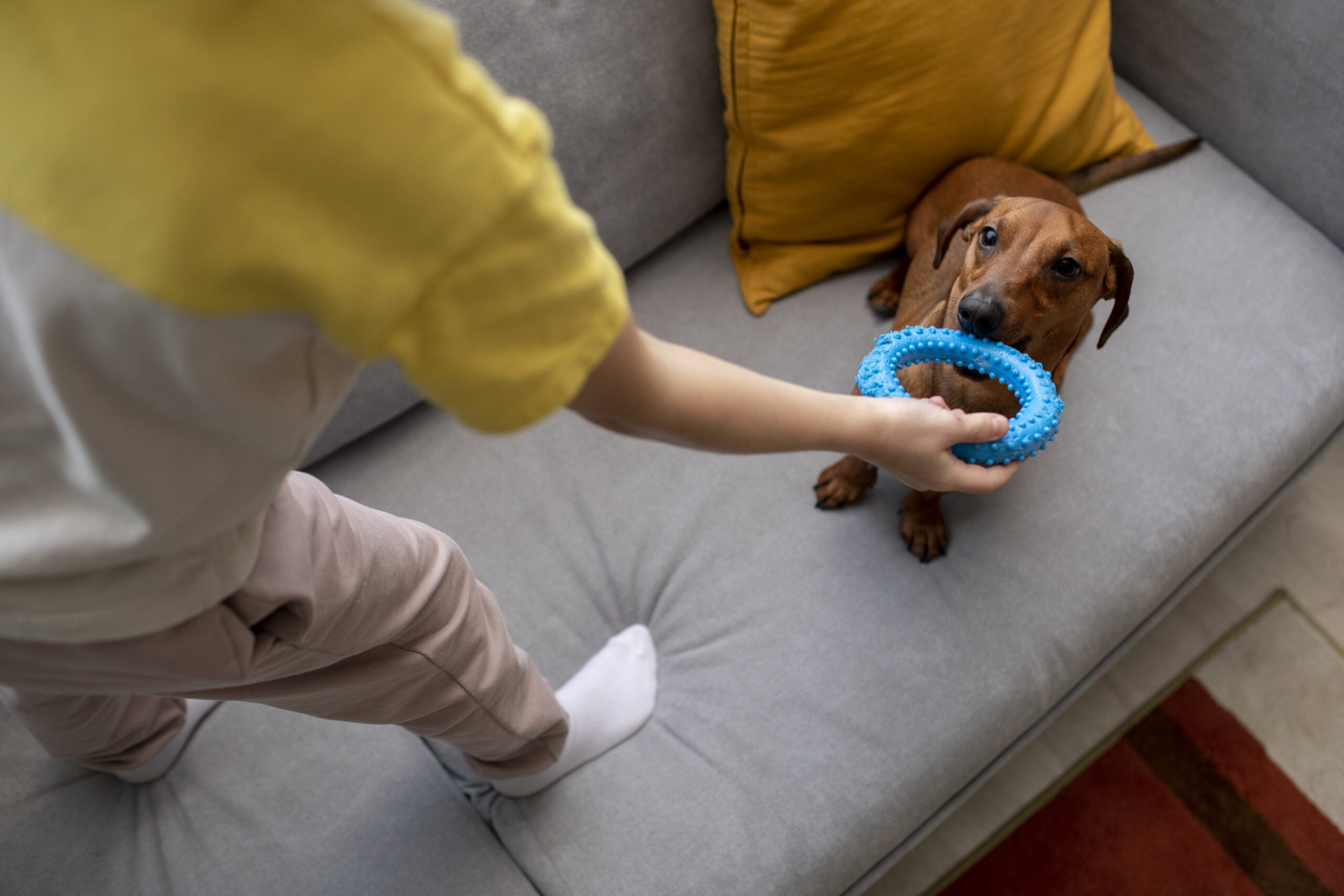Getting your new puppy vaccinated properly protects them from serious diseases and sets them up for a healthy life. This guide is designed for new puppy owners who want to understand when and what vaccines their furry friend needs.
You’ll learn about the essential core vaccines that every puppy must receive, regardless of where you live or your lifestyle. We’ll also walk you through the complete puppy vaccination schedule from 6 to 16 weeks, so you know exactly when to book those vet appointments. Finally, you’ll discover which optional vaccines might make sense based on your puppy’s lifestyle and your location’s specific health risks.
By the end, you’ll feel confident navigating your puppy’s vaccination needs and keeping your new best friend protected during those crucial first months.
Essential Core Vaccines Every Puppy Needs
DHPP Combination Vaccine Protection
Your puppy’s most important shield against disease comes in the form of the DHPP combination vaccine, which protects against four serious conditions that could threaten your pet’s life. This single shot covers Distemper, Hepatitis, Parvovirus, and Parainfluenza – all highly contagious diseases that spread rapidly among unvaccinated dogs.
Distemper attacks your puppy’s respiratory, gastrointestinal, and nervous systems. You’ll notice symptoms like fever, coughing, vomiting, and diarrhea. Without vaccination, this virus often proves fatal, especially in young puppies whose immune systems haven’t fully developed.
Hepatitis targets your dog’s liver, kidneys, and blood vessels. This sneaky disease can cause sudden death in puppies or lead to chronic liver problems that affect your pet’s quality of life for years.
Parvovirus remains one of the deadliest puppy killers. This aggressive virus destroys your puppy’s intestinal lining, causing severe bloody diarrhea and dehydration. Even with intensive veterinary care, many infected puppies don’t survive.
Parainfluenza contributes to kennel cough, creating persistent respiratory problems that make your puppy miserable and can develop into serious pneumonia.
Your puppy typically receives the DHPP vaccine in a series starting around 6-8 weeks old, with boosters every 3-4 weeks until they reach 16 weeks. This schedule ensures your growing puppy maintains strong immunity as maternal antibodies fade.
Rabies Vaccination Requirements
Rabies vaccination isn’t just smart healthcare for your puppy – it’s the law in most areas. This fatal viral disease affects your dog’s central nervous system and poses a serious risk to both pets and humans. Once symptoms appear, rabies is virtually always fatal, making prevention through vaccination absolutely critical.
You’ll need to get your puppy their first rabies shot between 12-16 weeks old, depending on your local regulations. Some areas require vaccination as early as 12 weeks, while others allow you to wait until 16 weeks. Check with your veterinarian about your specific location’s requirements to avoid legal issues.
Your puppy will need a rabies booster one year after their initial vaccination, then every three years after that in most states. However, some jurisdictions require annual boosters, so you’ll want to stay informed about your local laws.
Legal consequences of skipping rabies vaccination can be severe. If your unvaccinated dog bites someone or gets into a fight with another animal, you could face:
- Mandatory quarantine periods
- Heavy fines and legal penalties
- Forced euthanasia of your pet
- Personal liability for medical expenses
Keep your rabies certificate handy – you’ll need it for boarding, grooming, dog parks, and travel. Most facilities won’t accept your dog without current rabies documentation.
Vaccine Safety and Effectiveness Standards
Modern puppy vaccines undergo rigorous testing to ensure they’re both safe and effective for your growing dog. The vaccines your veterinarian administers meet strict standards set by the USDA and undergo years of clinical trials before reaching the market.
Safety measures protect your puppy during vaccination. Your vet will examine your puppy before each shot to make sure they’re healthy enough for vaccination. Sick puppies shouldn’t receive vaccines because their immune systems need to focus on fighting existing illness rather than building immunity to the vaccine.
Common side effects you might notice are typically mild and short-lived:
- Slight lethargy for 24-48 hours
- Mild soreness at injection site
- Reduced appetite for a day
- Low-grade fever
Serious reactions are rare but require immediate veterinary attention. Watch for:
- Difficulty breathing or swelling of face/throat
- Persistent vomiting or diarrhea
- Severe lethargy lasting more than two days
- Collapse or loss of consciousness
Your vet might recommend spacing out vaccines if your puppy has shown sensitivity to previous shots. Some dogs do better with individual vaccines rather than combination shots, though this approach requires more visits.
Vaccine effectiveness depends on proper storage, handling, and timing. Your veterinarian stores vaccines at precise temperatures and follows strict protocols to maintain their potency. This attention to detail ensures your puppy develops strong, lasting immunity against dangerous diseases.
Perfect Timing for Your Puppy’s First Shots

Optimal Age to Begin Vaccination Series
Your puppy’s vaccination journey typically starts between 6 to 8 weeks of age, though the exact timing depends on several factors. Most veterinarians recommend beginning the core vaccination series at 6 weeks, especially if your puppy came from a shelter, rescue, or high-risk environment where disease exposure is more likely.
If your puppy comes from a reputable breeder with healthy parent dogs and clean facilities, you might wait until 8 weeks for the first shots. This gives your puppy’s immune system a bit more time to mature while still providing protection during the critical socialization period.
Age-Based Vaccination Start Times:
| Puppy’s Situation | Recommended Start Age | Reasoning |
| High-risk environment | 6 weeks | Earlier protection needed |
| Low-risk, healthy breeder | 8 weeks | Balance immunity and development |
| Unknown background | 6-7 weeks | Conservative approach |
Maternal Antibody Interference Factors
Your puppy receives antibodies from their mother through nursing, creating a protective shield called maternal immunity. These antibodies are amazing at protecting newborn puppies, but they also create a tricky situation for vaccinations.
Maternal antibodies can block your puppy’s immune system from responding properly to vaccines. Think of it like having bodyguards that are so good at their job, they won’t let the vaccine’s training materials through. This interference typically lasts until your puppy is 12 to 16 weeks old, which is why multiple vaccination rounds are necessary.
The level of maternal antibodies varies based on:
- Your puppy’s mother’s vaccination status
- How much colostrum (first milk) your puppy received
- Individual genetic factors
- Timing of weaning
Risk Assessment for Early Socialization
You face a challenging balance between protecting your puppy from disease and providing essential socialization experiences. The critical socialization window closes around 16 weeks, but your puppy isn’t fully protected until 2 weeks after their final vaccination series.
Safe Socialization Strategies Before Full Vaccination:
- Controlled indoor environments: Invite vaccinated, healthy dogs to your home
- Puppy kindergarten classes: Choose facilities requiring vaccination records and proper sanitization
- Carry expeditions: Take your puppy out in your arms to experience sights and sounds
- Car rides: Let them observe the world from your vehicle
- Supervised yard time: Only in areas where unvaccinated dogs haven’t been
Avoid dog parks, pet stores, and areas with high dog traffic until your puppy completes their vaccination series. The risk of parvovirus, distemper, and other serious diseases outweighs the socialization benefits in these environments.
Breeder Vaccination Responsibilities
Responsible breeders play a crucial role in your puppy’s vaccination timeline. Quality breeders typically start the vaccination series before sending puppies to their new homes, usually giving the first round between 6 to 8 weeks.
What Good Breeders Provide:
- Complete vaccination records with dates and vaccine types
- Information about the mother’s vaccination history
- Health certificates from licensed veterinarians
- Clear timeline for upcoming vaccinations
- Contact information for their veterinarian
When you pick up your puppy, you should receive documentation showing exactly what vaccines were given and when. This information is vital for your veterinarian to create an appropriate continuation schedule. Some breeders even schedule your puppy’s next appointment or provide a health guarantee that requires specific vaccination protocols.
Be cautious of breeders who can’t provide vaccination records or seem unclear about what shots your puppy received. This lack of documentation could put your puppy’s health at risk and make it difficult for your vet to plan the proper vaccination schedule.
Complete Vaccination Timeline from 6 to 16 weeks

6-8 Week Initial Vaccination Round
Your puppy’s vaccination journey begins between 6 and 8 weeks of age, marking a critical milestone in their health protection. At this stage, your puppy’s immune system is developing, but maternal antibodies from their mother’s milk are starting to wane, creating a window of vulnerability that vaccines help bridge.
During this first round, your veterinarian will typically administer the DHPP vaccine, which protects against distemper, hepatitis, parvovirus, and parainfluenza. Some vets may also include a bordetella vaccine if your puppy will be exposed to other dogs early on. The exact timing depends on when your puppy was weaned and their overall health status.
You’ll notice your puppy might feel a bit sluggish for 24-48 hours after their first shots. This is completely normal as their immune system responds to the vaccines. Keep them comfortable and monitor for any unusual reactions like excessive swelling at the injection site or difficulty breathing.
10-12 Week Booster Shot Schedule
The second vaccination round comes 3-4 weeks after the initial shots, typically when your puppy is 10-12 weeks old. This booster is essential because your puppy’s maternal antibodies continue to decline, and their own immune system needs reinforcement to build strong protection.
Your vet will administer another DHPP vaccine during this visit. Depending on your location and your puppy’s risk factors, they might also add leptospirosis or Lyme disease vaccines. Some practices combine these into a 5-way or 6-way vaccine to reduce the number of injections your puppy receives.
By this age, your puppy’s personality is emerging, and they might be more anxious about vet visits. Bring their favorite treats and maintain a calm, positive attitude. Your energy directly affects how your puppy perceives the experience. This visit is also perfect for discussing your puppy’s behavior, diet, and any training questions you might have.
14-16 Week Final Puppy Series
The final round of puppy vaccines typically occurs between 14 and 16 weeks of age, completing their initial immunity building. This third vaccination ensures your puppy develops full protection against the core diseases, as some puppies may still have lingering maternal antibodies that could interfere with earlier vaccines.
Your vet will give the final DHPP booster and may recommend the rabies vaccine if your local laws require it by this age. Some areas mandate rabies vaccination by 12 weeks, while others allow it up to 16 weeks. Check your local requirements to stay compliant.
After this final round, your puppy will have significantly improved immunity, but they won’t reach full protection until about two weeks after their last shot. This means you’ll need to continue being cautious about exposure to unvaccinated animals and high-risk environments until they’re fully protected.
Documentation and Record Keeping
Maintaining accurate vaccination records is your responsibility as a pet owner and will serve you throughout your dog’s life. Your veterinarian will provide you with a vaccination certificate after each visit, but you should also keep your own organized records at home.
Create a simple file or digital folder containing all vaccination dates, vaccine types, lot numbers, and any adverse reactions. Many dog daycare facilities, boarding kennels, grooming salons, and training classes require proof of current vaccinations before accepting your pet. Having organized records makes these situations much easier.
| Record Type | What to Include | Why It Matters |
| Vaccination certificates | Date, vaccine type, lot number, vet signature | Required for services and travel |
| Reaction notes | Any side effects, timing, severity | Helps vet plan future vaccines |
| Next due dates | When boosters are needed | Prevents missed vaccinations |
Consider taking photos of all vaccination documents and storing them in your phone’s cloud storage. This gives you instant access to your puppy’s vaccination history even when you don’t have the physical papers with you. Many veterinary practices also offer online portals where you can access your pet’s complete medical records anytime.
Your puppy’s vaccination timeline sets the foundation for their lifelong health protection, so staying organized and following through with each scheduled appointment gives them the best possible start in life.
Optional Vaccines Based on Lifestyle and Location
Bordetella for Social Puppies
If your puppy will spend time around other dogs at doggy daycare, boarding facilities, grooming salons, or dog parks, the Bordetella vaccine becomes important. This vaccine protects against kennel cough, a highly contagious respiratory infection that spreads quickly in environments where dogs gather. Your puppy can catch kennel cough from something as simple as sharing water bowls or playing with infected dogs.
Most boarding facilities and doggy daycares require the Bordetella vaccine before they’ll accept your puppy. The vaccine comes in three forms: injectable, intranasal, or oral. The intranasal version provides faster protection, often within 72 hours, making it popular for puppies who need quick coverage. You can start this vaccine as early as 3 weeks of age, and many vets recommend it for puppies who will have high social exposure to other dogs.
Lyme Disease in High-Risk Areas
Your puppy needs the Lyme disease vaccine if you live in or plan to visit tick-heavy regions. The Northeast, upper Midwest, and Pacific Coast have the highest rates of Lyme disease transmission. Even if your area seems low-risk now, climate change is expanding tick populations into new territories.
The vaccine works best when started between 12-16 weeks of age, requiring two initial doses 2-4 weeks apart, followed by annual boosters. You’ll still need to use tick prevention products since the vaccine doesn’t protect against other tick-borne diseases like Rocky Mountain spotted fever or ehrlichiosis. Your vet can help you assess your local risk based on recent case reports and environmental factors in your specific area.
Canine Influenza Protection Options
Canine influenza has become more common in recent years, with two main strains affecting dogs: H3N8 and H3N2. Your puppy faces higher risk if you frequently travel with them, visit dog shows, or live in urban areas where outbreaks have occurred. The vaccine protects against both strains and requires two initial doses given 2-4 weeks apart.
This vaccine makes sense if your puppy will have exposure to dogs from different regions or if local veterinary clinics have reported recent cases. Symptoms of canine flu include persistent coughing, fever, and lethargy. While most dogs recover completely, some develop secondary bacterial infections that require treatment.
Lifestyle Assessment for Additional Coverage
Take an honest look at your puppy’s future lifestyle when deciding on optional vaccines. Urban puppies face different risks than rural ones. If you plan to hike frequently, your puppy needs different protection than one who’ll spend most time in suburban backyards.
Consider these factors:
- Travel frequency: Regular trips increase exposure to regional diseases
- Social exposure: Daycare, dog parks, and boarding facilities raise infection risk
- Geographic location: Local disease prevalence varies significantly
- Seasonal activities: Camping and hiking expose puppies to wildlife-transmitted diseases
- Housing situation: Apartment dogs have different risks than those with large yards
Your vet can provide local disease maps and outbreak information to help you make informed decisions. Many optional vaccines require annual boosters, so factor ongoing costs into your decision-making process.
Post-Vaccination Care and Monitoring
Normal Side Effects to Expect
Your puppy might show some mild reactions after getting vaccinated, and these are completely normal signs that their immune system is working hard. You’ll likely notice your little one seems a bit tired or sleepy for the first 24-48 hours after their shots. This drowsiness is your puppy’s body redirecting energy to build immunity, so don’t worry if they’re less playful than usual.
A small, tender bump at the injection site is another common reaction you might feel when petting your puppy. This localized swelling typically appears within a few hours and should disappear within a week. Your puppy might also run a low-grade fever, which you can detect if their nose feels warmer than usual or they seem less interested in food and water.
Some puppies experience mild digestive upset, including loose stools or occasional vomiting within the first day. You might also notice your puppy drinking slightly more water than normal or seeking out cooler spots in your home. These reactions show that your puppy’s immune system is responding appropriately to the vaccines.
Warning Signs Requiring Veterinary Attention
While mild reactions are expected, certain symptoms demand immediate veterinary care. If your puppy develops facial swelling, especially around the eyes, muzzle, or throat, contact your vet right away as this could indicate an allergic reaction.
Watch for difficulty breathing, excessive drooling, or pale gums – these are emergency signs that require immediate attention. Persistent vomiting or diarrhea lasting more than 24 hours, particularly if you notice blood, needs professional evaluation.
You should also be concerned if your puppy shows extreme lethargy that lasts beyond 48 hours, refuses to eat for more than a day, or develops a high fever. Hives, intense itching, or any unusual behavioral changes like disorientation or seizures are red flags that need immediate veterinary intervention.
If the injection site becomes increasingly swollen, hot to the touch, or shows signs of infection like discharge, schedule a vet visit promptly.
Activity Restrictions After Shots
Your newly vaccinated puppy needs some downtime to let their immune system do its work effectively. Keep exercise light and avoid strenuous activities like long hikes, intense play sessions, or puppy training classes for 24-48 hours after vaccination.
Short, gentle walks in your yard are fine, but skip the dog park and avoid areas where unvaccinated animals might have been. Your puppy’s immune system is temporarily busy processing the vaccines, making them more susceptible to picking up other illnesses during this window.
Swimming should be off-limits for at least a week, as wet conditions can increase infection risk at injection sites. You’ll also want to postpone any grooming appointments that involve bathing for a few days.
Inside your home, let your puppy rest as much as they want. Provide a comfortable, quiet space where they can retreat if they’re feeling under the weather. Avoid introducing new foods or treats during this recovery period, as their digestive system might already be slightly sensitive.
Immune System Development Timeline
Understanding how your puppy’s immunity develops helps you make better decisions about their protection and activities. After each vaccination, your puppy’s immune system needs about 10-14 days to build protective antibodies against the diseases they’ve been vaccinated for.
During the first week post-vaccination, your puppy’s immunity is actually at its lowest point as their system works to recognize and respond to the vaccine antigens. This is why you need to be extra careful about exposure during this vulnerable period.
By the second week, antibody levels start rising significantly, and by day 14, your puppy should have solid protection against the vaccinated diseases. However, full immunity from the complete puppy series doesn’t kick in until about two weeks after their final booster shot, typically around 18-20 weeks of age.
Your puppy’s maternal antibodies, received through nursing, gradually decline over their first few months of life. This creates windows of vulnerability between when maternal protection wanes and vaccine-induced immunity develops, which is why the vaccination schedule includes multiple boosters spaced weeks apart.
Remember that even after full vaccination, your puppy’s immune system continues maturing until they’re about six months old. During this entire period, maintaining good hygiene and avoiding high-risk environments helps ensure your vaccination investment pays off with lifelong protection.
Cost-Effective Vaccination Strategies

Veterinary Clinic vs Low-Cost Options
Your choice of where to get your puppy vaccinated can significantly impact your wallet. Traditional veterinary clinics typically charge between $100-200 for a complete puppy vaccination series, but you’ll receive comprehensive care including health examinations, personalized advice, and established medical records.
Low-cost alternatives like animal shelters, pet stores, and mobile vaccination clinics often charge 30-50% less. These options usually focus solely on administrations without extensive health checks. While you’ll save money upfront, you might miss early detection of health issues that could become costly later.
| Option | Cost Range | Pros | Cons |
| Veterinary Clinic | $150-300 | Full health exam, medical records, ongoing care | Higher cost, appointment needed |
| Low-Cost Clinics | $75-150 | Affordable, walk-in available | Limited services, no health screening |
| Mobile Units | $60-120 | Convenient, competitive pricing | Variable quality, no follow-up care |
Consider your puppy’s specific needs when choosing. Healthy puppies from reputable breeders might do fine with low-cost options, while rescue puppies or those with unknown histories benefit from full veterinary evaluations.
Package Deals and Payment Plans
Many veterinary practices offer puppy packages that bundle all necessary vaccinations, deworming, and initial health checks into one discounted price. These packages typically save you 15-25% compared to paying for individual visits and can range from $200-400 depending on your location and services included.
Look for packages that include:
- All core vaccinations (DHPP series and rabies)
- Deworming treatments
- Fecal examinations
- Microchipping
- Spay/neuter discounts
Payment plans make expensive veterinary care more manageable. Many clinics now offer:
- Interest-free payment options for 6-12 months
- Monthly payment plans for ongoing care
- Third-party financing through companies like CareCredit or Scratchpay
- Wellness plans with monthly payments that cover routine care
Some pet insurance companies also offer wellness riders that cover vaccination costs. While these add to your monthly premium, they can reduce your out-of-pocket expenses for routine care.
Long-Term Health Investment Benefits
Viewing vaccinations as a health investment rather than just an expense changes your perspective entirely. The upfront cost of proper vaccination pales in comparison to treating preventable diseases. Parvovirus treatment alone can cost $1,500-3,000, while distemper or hepatitis can require even more expensive intensive care.
Properly vaccinated puppies typically have:
- Lower lifetime veterinary costs
- Reduced risk of emergency situations
- Better overall health and longevity
- Higher resale or breeding value if applicable
Regular vaccination also protects your community’s pet population through herd immunity, reducing disease outbreaks that could affect your own pets. Many boarding facilities, grooming services, and dog parks require current vaccination records, so staying up-to-date keeps more doors open for your puppy’s socialization and care needs.
The investment in quality veterinary care during puppyhood often pays dividends throughout your dog’s life. Puppies who receive comprehensive early care, including proper vaccinations and health screenings, tend to have fewer health complications as adults, saving you money and heartache down the road.
Your puppy’s vaccination journey sets the foundation for a lifetime of health and protection. From those crucial core vaccines like DHPP and rabies to the optional shots that depend on your lifestyle and location, staying on top of the 6-16 week schedule protects your furry friend from serious diseases. You’ll want to monitor your pup closely after each visit and work with your vet to create a cost-effective plan that fits your budget.
Don’t wait to get started – puppies are most vulnerable to disease in their early weeks, and every day without proper protection puts them at risk. Book that first appointment with your veterinarian and keep detailed records of each vaccination date. Your puppy’s future health depends on the decisions you make today, so take that first step and give your new companion the protection they deserve.



